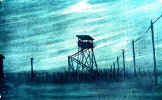The Last German Soldier at Stalag Luft I
By Verne Woods
I've
often wondered if others in North Compound I who witnessed the scene
that I describe here remember it as I still do, a sadly dissonant note
to the joy of liberation.
Stalag Luft I was made up of four compounds.
My compound, North Compound I, was near the headquarters building where
three female members of the Luftwaffe auxiliary worked. We called them
luftwaffettes. Two were dowdy, made more so by their rumpled, ill-fitting uniforms. But the third was Betty
Grable and Rita Hayworth in one idealized package, at least to us on the
other side of the barbed wire who had seen no other women for a year.
Furthermore, she wore her Luftwaffe uniform smartly, proudly.
so by their rumpled, ill-fitting uniforms. But the third was Betty
Grable and Rita Hayworth in one idealized package, at least to us on the
other side of the barbed wire who had seen no other women for a year.
Furthermore, she wore her Luftwaffe uniform smartly, proudly.
The three women were censors, reading our mail
and sometimes using heavy black ink to obliterate sentences and
paragraphs from the special forms on which we composed our letters.
Thus, the three women knew all of our dreams because we would express
these yearnings with a shameless sentimentality to those whom we longed
to see and hold again. Sometimes, we on the other side of the fence
might elicit a smile from one or the other of the two dowdy ones, but
never from corporal Grable-Hayworth. Hers was always a haughty disregard
as she walked briskly by on whatever business had taken her outside the
headquarters building.
In time, the quality
of our guard force deteriorated. Older men, sometimes old men, became
replacements. These were members of the Volkstrum, mostly World War I
veterans. We felt sorry for them, especially on bitterly cold days during
the winter of l944-45, when they were forced to endure long hours in the
open, windswept towers. There was one who, when we ventured out into the
biting wind for exercise, called down from his tower, "Kalt, ja?"
and we responded, "Ja, kalt."
The Russians had crossed the
Oder River, 100 miles away. We could hear the deep thunder of German and
Russian artillery from the east. It was the last week of April, 1945,
and the end was near. On the afternoon of April 30, a cadre of guards
and officers begin to assemble on the other side of the barbed wire
where our mess hall (which had burned down months earlier) had been. Two
vehicles pulled up, a truck and an open staff car. A German officer,
pensive and impassive, and two of his aides stood to one side watching
the men assemble.
A sergeant rushed the men
along with, "Schnell! Schnell!" as they straggled from the
barracks loaded with possessions. Some had strapped these possessions to
bicycles which they pushed toward the forming company ranks. One or two
even pushed loaded carts. We spotted corporal Grable-Hayworth amid the
as-yet-uncoalesced company formation. As she conversed with the men, she
occasionally glanced over in our direction.
At first, as we watched, we
hesitated to cross the warning wire that stretched around the inside
periphery of the compound, six feet from the barbed wire fence. Then
someone daringly stepped over it to the fence itself and called out to a
guard he knew by name offering him a cigarette. The guard broke ranks
(such as they were) and came to the fence to accept it. While this was
going on, a bottle of schnapps was being passed around within the
formation. Knowing we were watching this collapse of discipline,
corporal Grable-Hayworth admonished them sharply and, this failing, she
tried to intercept the bottle, rather like a child grasping for a toy
held away by deriding older siblings.
We had by now moved with
impunity across the warning wire into the forbidden territory next to
the fence. Because the American Red Cross had been generous in the
provisioning, we had lots of cigarettes to spare and share. We called
out to the guards to come and get them. And they did. To the corporal,
this was a more serious breach than the schnapps bottle. She rushed over
to interpose herself between the proffering arms stretched through the
fence and the receiving hands. We then began throwing the cigarettes
over the fence. The guards, having now completely broken ranks,
scrambled about picking them up.
The officer in command,
witnessing all this, finally bellowed out a command, and the men quickly
cowered back into formation. Corporal Grable-Hayworth, with her foot,
deliberately obliterated several unretrieved cigarettes scattered about
and then stood before to the fence to address us.
"Why do you do
this?" she said, her pretty face flushed in fury. "Why do you
do this mean thing?" That choice of word, "mean," was one
that I would wonder about many times later. We had done much
"meaner" things, like bombing her cities. Was it simply her
limited English vocabulary? Had she the greater choice of words to draw
upon from her own language, would she have used an adjective more
precisely descriptive? Whether she intended it or not, I concluded that
she had chosen well. What we on the other side of the fence had done was
indeed a "mean" thing, perhaps the "meanest" thing
of all, the stripping away of dignity.
Finally, the officer and his
two aids climbed into the open- sided staff vehicle and, followed by the
loaded truck, drove away. The sergeant, without calling the men to
attention, gave an order in an almost conversational tone; they began to
walk away, some pushing bicycles and carts. Already they were a refugee
band. Only corporal Grable-Hayworth, taking a position alongside the
column, marched.
